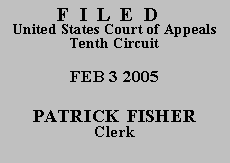 UNITED STATES COURT OF APPEALS
UNITED STATES COURT OF APPEALS
 UNITED STATES COURT OF APPEALS
UNITED STATES COURT OF APPEALS
TENTH CIRCUIT
| UNITED STATES OF AMERICA, | |
| No. 03-3366
(D.C. No. 03-10040) (D. Kan.) | |
ORDER AND JUDGMENT(*)
Before SEYMOUR, BALDOCK, and BRISCOE, Circuit Judges.(2)
We review the district court's factual findings for clear error, United States v. Patten, 183 F.3d 1190, 1193 (10th Cir. 1999), and the ultimate determination of "reasonableness" under the Fourth Amendment de novo. United States v. Mikulski, 317 F.3d 1228, 1230-31 (10th Cir. 2003). The record fully supports the historical facts, as found by the district court, and we need not repeat them here. See Mullane, 2003 WL 22466163 at *1-2. After a thorough review of the briefs and record, we hold the district court correctly denied Defendant's motion to suppress.
To the extent the district court did not specifically address Defendant's argument that one officer may not rely on another officer's reasonable suspicion when conducting a traffic stop, we now reject this argument. We have specifically held that police officers are entitled to rely upon information relayed to them by other officers in determining whether reasonable suspicion exists to justify an investigative detention. Oliver v. Woods, 209 F.3d 1179, 1190-91 (10th Cir. 2000); United States v. Hensley, 469 U.S. 221, 232 (1985) (holding "effective law enforcement cannot be conducted unless police officers can act on directions and information transmitted by one officer to another."). In this case, the record shows Trooper Phillips dispatched a bulletin over the radio informing other officers to be on the lookout for Defendant's pickup truck because the truck had committed a traffic violation and may be involved in drug trafficking. A local officer observed, and stopped, the blue truck described in the bulletin. The officer's reliance on Trooper Phillips' radio bulletin and subsequent stop of Defendant's truck was entirely lawful.
The district court's denial of Defendant's motion to suppress is
AFFIRMED.(1)
*. This order and judgment is not binding precedent, except under the doctrines of law of the case, res judicata, and collateral estoppel. The court generally disfavors the citation of orders and judgments; nevertheless, an order and judgment may be cited under the terms and conditions of 10th Cir. R. 36.3.
2. After examining the briefs and appellate record, this panel has determined unanimously that oral argument would not materially assist the determination of this appeal. See Fed. R. App. P. 34(a)(2); 10th Cir. R. 34.1(G). The case is therefore ordered submitted without oral argument.
1. Defendant's Motion to Stay Decision is also denied.